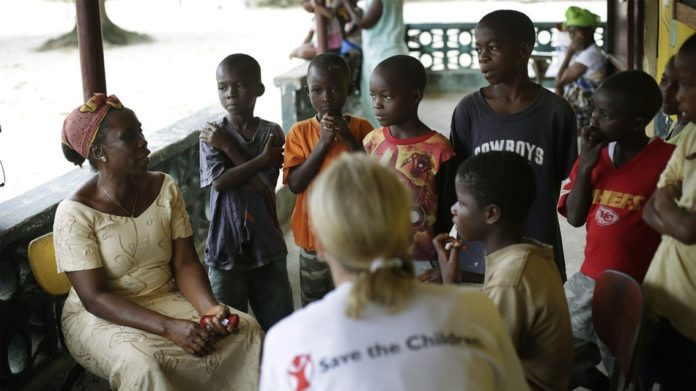Thousands of Children Orphaned by West Africa’s Ebola Crisis

A range of international organizations are ramping up their responses to help children who are increasingly affected by the Ebola outbreak in western Africa.
Save the Children, an independent NGO that provides services to children around the world, is building two Ebola treatment centers and 10 community care units in the region, as part of an expanded effort to help children and families affected by the crisis.
Unicef, the leading international children’s charity, also said it is conducting a number of lifesaving awareness campaigns in all three countries, providing “mass quantities of medical supplies, tents, protective equipment, soap, chlorine, latex, gloves, masks and more,” according to a spokesperson.
The goal, Save the Children CEO Carolyn Miles told Mashable after a recent visit to the region, is simple: Stop transmission of the virus.

Carolyn Miles, the CEO for Save the Children in Unification Town, Liberia, on Oct. 3, 2014.
Image: Jerome Delay/Associated Press
“For every one person that gets Ebola, more than one other person is getting it,” she said. “That’s what you’ve gotta change.”
The group recently released a YouTube video that states Ebola has reached a “tipping point.”
“If we and the international community can’t step up our recent to halt the spread now, cases could run to hundreds of thousands in the future,” the group’s Dan Stewart says in the clip.
An estimated 7,470 people have been infected with Ebola in western Africa since the start of the most recent outbreak, resulting in 3,431 reported deaths, according to the World Health Organization’s latest assessment.

A WHO chart shows cases of Ebola virus disease in Guinea, Liberia, and Sierra Leone, as of Oct. 1, 2014.
Image: WHO
Most of those who are dying are parents, creating a secondary crisis for their children. An estimated 3,700 have lost their parents to Ebola in the recent outbreak, according to Unicef.
These are numbers that are believed to be widely underestimated.
The average family in Liberia, for instance, includes three children — meaning three kids that are affected for nearly each person that dies of the disease.
Fati & Adamssay, 3 mths @ Kailahun #Ebola Care Center. Her mum is sick, her husband too. They r negative. 4 how long? pic.twitter.com/DwSzKAb7Y5
— anne boher (@anneboher) September 29, 2014
“Thousands of children are living through the deaths of their mother, father or family members from Ebola,” said Manuel Fontaine, UNICEF regional director for West and Central Africa, who spent the past two weeks on a visit to Guinea, Liberia and Sierra Leone.
“These children urgently need special attention and support; yet many of them feel unwanted and even abandoned,” Fontaine said. “Orphans are usually taken in by a member of the extended family, but in some communities, the fear surrounding Ebola is becoming stronger than family ties.”
Miles, with Save the Children, recently met one group of four siblings, ages 18, 8, 6 and 3, who were on their own and living on the street after their mother was killed by the virus.
Their house was boarded up and everything inside was burned to kill any remnants of the virus, so the kdis had nowhere else to turn.
“Lots of kids there are shunned by their communities due to worry about infection,” Miles said, “even though these kids had gone more than 21 days since exposure.”
#Ebola making 1000’s of #kids orphans. These 4 lost Mom but thankfully being raised by aunts – many not so lucky pic.twitter.com/vlqG1sXXqP
— Carolyn Miles (@carolynsave) October 6, 2014
A big part of Save the Children’s work is helping affected kids stand back up on their feet and putting them back in homes with family or friends.
Tried hard to make this little boy smile today. At 10,has lost both parents to #Ebola, no extended family found yet pic.twitter.com/whxZuAzoS1
— Carolyn Miles (@carolynsave) October 3, 2014
This means first providing them with standard household items and helping track down members of their extended families. That’s an easier job when the kids are older; not so much when dealing with toddlers.
“You mostly have to depend on the children,” Miles said. “One 18-year-old was able to give us lots of information about where her family was from, naming her aunts, uncles. But with little kids it is really tough because they usually don’t even know.”
In those cases, the charity is working with foster families who take the kids in; others wind up at independent care units. But the best thing is to get kids back to their extended family if possible, she said.
Zeinabou, 4, survived to #Ebola & will be soon reunified w/ her family tx 2 @UNICEF support. Give an hand 2 #children pic.twitter.com/XMuVl5ZfJw
— anne boher (@anneboher) September 28, 2014
Both Save the Children and Unicef have appealed for more people — and, crucially more funds — to help support the children affected by the Ebola outbreak.
“Ebola is turning a basic human reaction like comforting a sick child into a potential death sentence,” said Unicef’s Fontaine in a recent assessment. “The vast majority of the children affected by Ebola are still left without appropriate care. We cannot respond to a crisis of this nature and this scale in the usual ways. We need more courage, more creativity, and far far more resources.”
“There’s still time for people to support this response and do something to help people there,” Miles added. “Making donations to Save the Children or anyone else who is working on this can help. People is one limiting factor — and obviously money is the other,” she said.
“We’ve got to reach more kids.”
BONUS: What If Ebola Made It to New York City?
Have something to add to this story? Share it in the comments.
